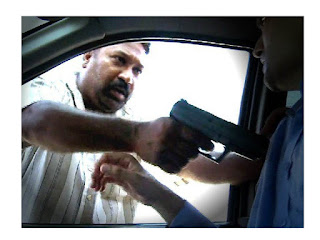Death by Chance
What’s the chance of a bad outcome,like death,
in Karachi? Based on anecdotes circulated on social media and what you read in
the news, you might assume that chances for a series of unfortunate events
remain high in this city.
This prompted a friend to do some
calculations to gauge chance
of an unexpected death in Karachi, compared to any major metropolitan
city in the U.S. Assuming how the percentages were
arrived at was fairly accurate, the bottom line, if true, was intriguing: the
likelihood of an untimely, unexpected death was similar in the two places.
Delving into death rates in Karachi
vs. elsewhere was perhaps meant to be an intellectual discourse following the
meaningless death of a colleague’s sister in Karachi. Being gunned down outside
a famous restaurant after a meal there is hard to rationalize as an expected
outcome of a botched cell phone robbery attempt. But this is Karachi. And such
occurrences are unfortunately all too frequently heard and shared. Even a
single such account is one too many and if the victim is known to you then the
mind (and heart) tends to assume that tragedy is at everyone’s doorstep in
Karachi, irrespective of what the statistics reveal.
Most people, myself included, had
not quite come to terms with the tragic demise of our colleague’s sister, but
in its wake a series of back and forth emails resulted. The objective of the
process was meant to be a catharsis of sorts, by providing a forum to vent.
Regardless of the likelihood of a bad death being similar in two markedly
distinct places like the U.S. and Pakistan, some colleagues were adamant that
it was time to pack up and move (or move back, as the case may be) to a safer
haven, like the U.S.
That got me thinking about traumatic
experiences of mine. In the not too distant past two things had happened to me
that shook me up.
(1) My car was shot at. The
trajectory was straight through the number plate, back seat and the bullet had
then lodged into the glove compartment up ahead. Luckily, or perhaps by
divine intervention, my daughter was not in her car seat: the bullet had neatly
penetrated the infant car seat, along with the back seat.
(2) My house was burglarized. The
front door was rammed through and it hung on its hinges. Cabinets, drawers,
wardrobes, kids’ toy chests, everything had been rifled through. The burglar
alarm was ripped off the wall and it lay on the ground, ineffective. The
telephone cable outside had been cut. Luckily all this happened while we were
out for dinner. What if we had been home and the burglars had decided to force
themselves on us and our kids?
The above were also statistics – a
game of luck by chance,
perhaps. And you might assume that it occurred to me in Karachi. Sorry to burst
your bubble, but both episodes, now etched in my memory, were in two different
localities of Houston, Texas, where I lived for a long time, prior to my
relocation to Karachi two years back. They occurred over a five year period
(2008-2012). The burglary happened in one of the best, and presumably safest, neighborhoods
of Houston.
Perhaps I am a harbinger of bad news
by suggesting it might be a false sense of security that upscale neighborhoods
of the U.S. are far safer than their counterparts in Karachi. My basic premise
is that when an unfortunate, unexpected event happens to you, you add to the
statistics, and that then becomes your reality, no matter what the odds were of
that occurrence. So delving into percentages and likelihoods to explain or rationalise poor
outcomes seems to be an exercise in futility.
And perhaps same goes for what
happens in Karachi. If badness happens to you then the odds of it
happening in Karachi is a meaningless discussion point, in my opinion. Or in the words of another friend, “statistics provide little comfort when you
are the victim”.
[from the Karachi-Houston Diaries]




Comments
Post a Comment